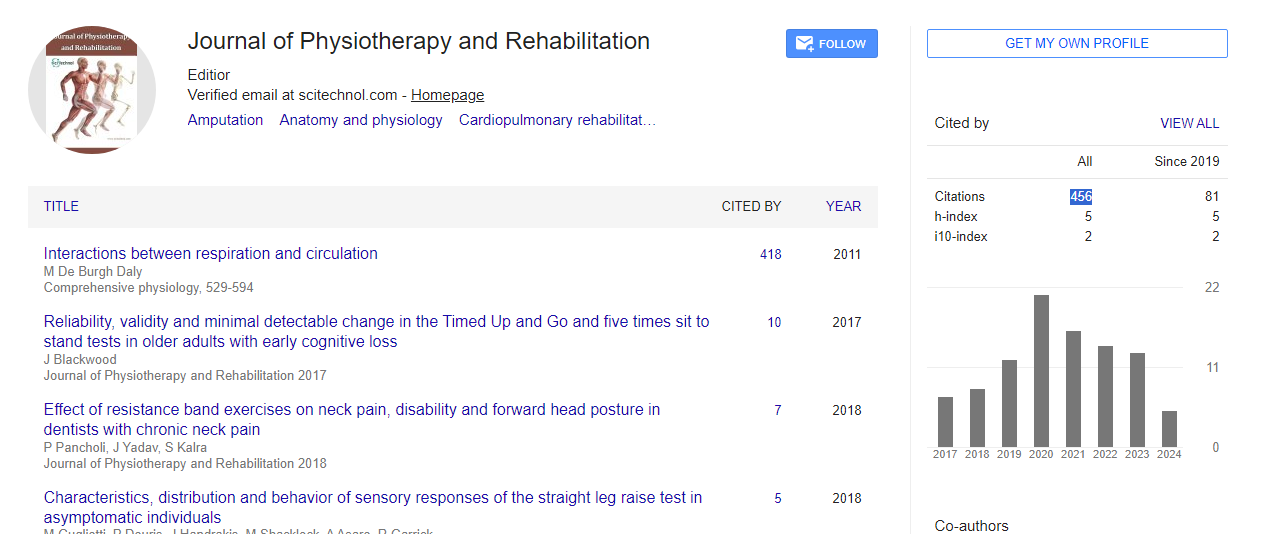Commentary, J Physiother Rehabi Vol: 8 Issue: 5
Importance of Personalized Recovery Plans in Effective Psychiatric Rehabilitation for Mental Health Patients
Sophia Morales*
1Department of Rehabilitation, National Taiwan University Hospital, Taipei, Taiwan
*Corresponding Author: Sophia Morales,
Department of Rehabilitation, National Taiwan University Hospital, Taipei, Taiwan
E-mail: sophia_morales@twain.edu
Received date: 24 September, 2024, Manuscript No. JPTR-24-151643
Editor assigned date: 26 September, 2024, PreQC No. JPTR-24-151643 (PQ);
Reviewed date: 10 October, 2024, QC No. JPTR-24-151643
Revised date: 17 October, 2024, Manuscript No. JPTR-24-151643 (R);
Published date: 24 October, 2024, DOI: 10.4172/JPTR.1000187.
Citation: Morales S (2024) Importance of Personalized Recovery Plans in Effective Psychiatric Rehabilitation for Mental Health Patients. J Physiother
Rehabi 8:5.
Description
Personalized recovery plans are important in psychiatric rehabilitation for individuals with mental health disorders, serving as a roadmap for recovery tailored to each patient’s unique needs, preferences and circumstances. These plans are designed to address the complex and varied nature of mental health conditions, recognizing that a one size fits all approach is often insufficient for achieving optimal outcomes. By incorporating individualized strategies, personalized recovery plans empower patients, enhance treatment efficacy and promote overall well-being. The importance of personalized recovery plans begins with the recognition that mental health disorders manifest differently in each individual. Factors such as the type of disorder, its severity, the patient’s personal history, cultural background and social environment all play significant roles in shaping their experience and recovery journey. Therefore, a comprehensive assessment of these factors is essential in creating an effective recovery plan. Adapting in interventions to align with the patient’s specific situation increases engagement and motivation, encourage a sense of ownership over their recovery process.
Central to personalized recovery plans is the collaborative approach between patients and mental health professionals. This partnership ensures that patients are actively involved in their treatment, allowing them to express their goals, preferences and concerns. Engaging patients in the decision-making process not only enhances their commitment to the plan but also helps build a trusting therapeutic relationship. This collaborative approach can lead to increased adherence to treatment and improved outcomes, as patients feel valued and heard in their recovery journey. By considering the individual’s physical health, emotional well-being, social connections and vocational aspirations, recovery plans become more comprehensive and effective.
Another key aspect of personalized recovery plans is the setting of achievable and measurable goals. Establishing specific, realistic objectives provides patients with a clear direction and milestones to track their progress. These goals can range from developing coping strategies and enhancing social skills to securing employment or improving relationships. Regularly reviewing and adjusting these goals as needed ensures that the recovery plan remains relevant and aligned with the patient’s evolving needs and circumstances. Moreover, personalized recovery plans facilitate continuity of care, which is vital in the often fragmented mental health system. By establishing a clear framework for treatment and support, these plans can bridge gaps between different services and providers. This continuity helps ensure that patients receive consistent care, reducing the likelihood of setbacks and relapses. Effective communication among the various members of the treatment team, including psychiatrists, therapists, social workers and support staff, is essential in maintaining this continuity and ensuring that everyone involved is on the same page regarding the patient’s recovery. Additionally, by encourage recovery and flexibility among individuals with mental health disorders, personalized plans contribute to healthier communities and reduce the societal stigma associated with mental illness.
Conclusion
Personalized recovery plans are vital in psychiatric rehabilitation for mental health patients. They empower individuals by recognizing their unique needs, encourage collaboration and promoting comprehensive care. By establishing clear goals and facilitating continuity of care, these plans enhance treatment efficacy and overall well-being. Ultimately, the importance of personalized recovery plans lies in their ability to provide a tailored and supportive framework that encourages individuals to take charge of their recovery, leading to improved outcomes and a better quality of life.
 Spanish
Spanish  Chinese
Chinese  Russian
Russian  German
German  French
French  Japanese
Japanese  Portuguese
Portuguese  Hindi
Hindi 